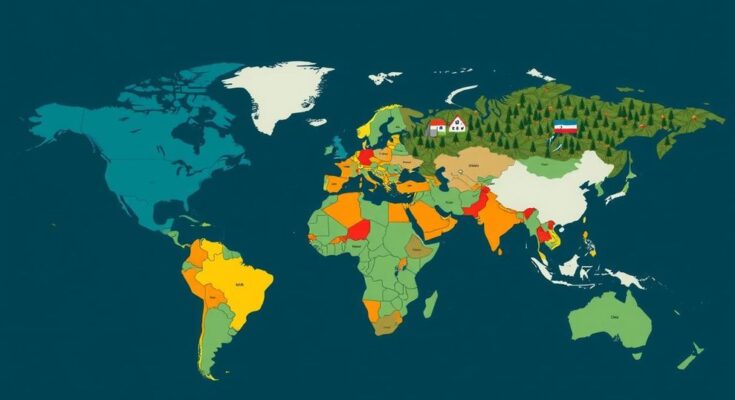Richer countries are initiating compensation for climate change damages to poorer nations, highlighted by a payment received by a Malawi farmer after Cyclone Freddy. This marks the start of a “loss and damage” fund aimed at aiding those most affected by climate disasters. Discussions at COP29 are ongoing regarding the financial obligations of wealthier nations, as the need for such support is projected to escalate amidst increasing climate events.
Richer nations are beginning to compensate poorer countries for climate-induced damages, exemplified by the case of Christopher Bingala from Malawi, who suffered significant losses due to Cyclone Freddy. Receiving approximately $750 as part of a novel “loss and damage” fund allowed him to rebuild his home after the devastating flood. This emerging compensation system addresses the urgent needs of low-income countries, which disproportionately endure the consequences of climatic disruptions despite contributing minimally to global pollution.
At the recent COP29 climate summit in Baku, discussions are ongoing regarding the amount owed to developing nations, as part of a comprehensive “climate finance” strategy that encompasses both loans and investments. Wealthier countries, including the European Union and the United States, are anticipated to pledge funds to aid those affected by climate change, although experts caution that the current pledges may not suffice in addressing the escalating challenges posed by natural disasters.
Cyclone Freddy’s impact was felt widely across the region, displacing 650,000 individuals in Malawi alone, compounding the challenges faced by those who rely on subsistence farming. The financial assistance received enabled families to transition to safer locations, offering hope for a more stable future despite ongoing obstacles. Scotland has been noted for its proactive engagement by being the first to allocate funds facilitating loss and damage, with initiatives like GiveDirectly distributing these resources effectively.
The necessity for loss and damage funding is projected to grow as extreme weather events continue to increase in frequency and intensity. Prime Minister Davis of the Bahamas highlighted that the reliance on borrowing for recovery is significantly widening their national debt. A new funding allocation mechanism is proposed, aimed not only at disaster recovery but also at addressing long-term challenges such as relocation and preservation of cultural and ecological assets. As the financial demands rise, it remains imperative for developed countries to recognize and act upon their responsibility to support vulnerable nations facing the dire consequences of climate change.
The topic of climate change compensation for low-income nations is increasingly pertinent, particularly as the impacts of severe weather events, such as Cyclone Freddy, become more pronounced. These countries, which contribute minimally to global emissions, are often the most affected by climate-related disasters. In response to this growing disparity, developed nations have agreed to establish funding mechanisms through initiatives like the “loss and damage” fund. This initiative is designed to acknowledge and address the ecological and socioeconomic damages inflicted upon vulnerable populations due to climate changes that they did not contribute to.
In conclusion, the establishment of compensation structures for loss and damage marks a significant step towards addressing the injustices faced by low-income countries in the wake of climate change. As seen through the experiences of individuals like Christopher Bingala, such financial assistance is essential for rebuilding lives and fostering resilience. However, the urgency of the funding must be met with substantial pledges and clear guidelines, ensuring equitable support for a growing number of nations grappling with climate-induced adversities.
Original Source: www.kanw.com




